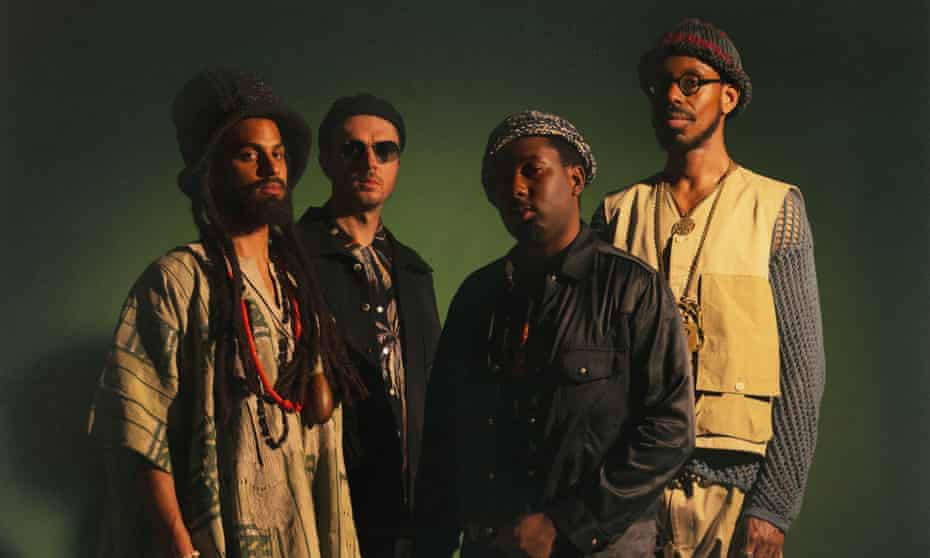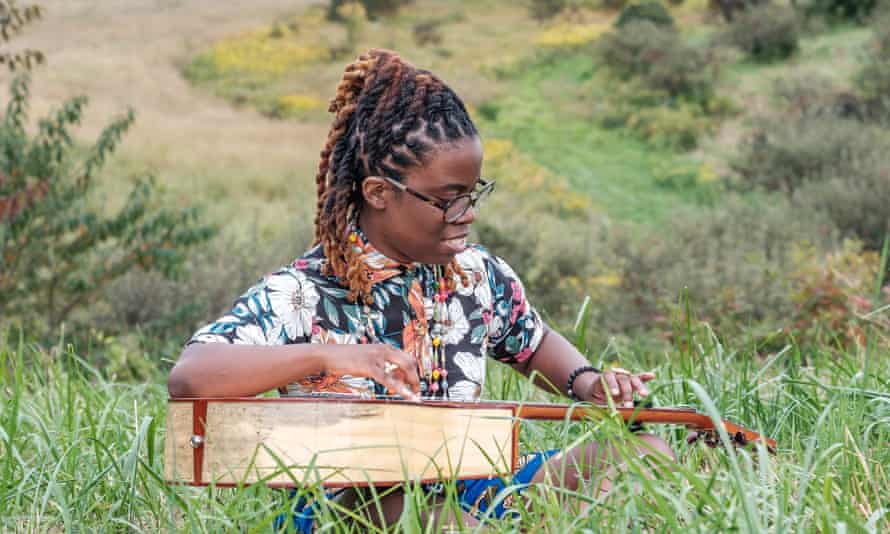Arooj Aftab – Vulture Prince
Following her 2015 debut Bird Under Water, Brooklyn-based Pakistani composer Arooj Aftab intended to make a more danceable second album. Then came the unexpected death of her brother, bringing new meaning to the Vulture Prince concept she had taken as her working title. Here, she reimagines Urdu ghazals over shuddering violin and tense harp, the production sombre, patient and heavily affecting – especially as a space for grief after a year of unfathomable loss. LS
Part of the current fecund strain of British art-prog alongside Black Midi and Squid, BCNR married klezmer, garage rock and Tortoise-y jazz in a highly original melange. But it’s the lyricism, and its delivery by Isaac Wood, that really sets them apart: neurotic, proud, hurt, fitfully romantic, and with a great sense of comedy: “Still living with my mother / As I move from one micro-influencer to another.” BBT
The Body – I’ve Seen All I Need to See

There’s a truly apocalyptic mood on the latest LP by the Rhode Island duo, their heavily distorted tracks evoking the sound of falling masonry or the sudden arrival of a locomotive through your front window. By screaming at a distance from the mic, Chip King’s vocals are carried off in the melee – resonating like a siren deep inside one’s adrenal glands, notes of pure animal fear. BBT
Y2K style is unavoidably resurgent, and while you might prefer that low-rise jeans, flip-phone fetishism and pop-punk remained in the past, Portuguese-born, Denmark-raised producer Erika de Casier’s affinity for the era’s Timbaland/Darkchild nexus of R&B is a welcome throwback. Her second album (and first for 4AD) echoes its uncanny glimmer of sophistication, a fitting contrast to the trash men she excoriates with poise and sly humour. LS
Nick Cave and Warren Ellis – Carnage
A triumph of impossibly rich songwriting that ranks close to its career-best predecessor Ghosteen, Carnage finds Cave ruminating on his youth and the upheavals of 2020 – “when everything is ordinary until it’s not” – while Ellis provides a dense, shifting, vividly alive musical backdrop of loops, electronics and strings. AP
Chai – Wink
If a good band should make you want to join their gang, then Chai are the form’s platonic ideal. The Japanese four-piece radiate cheer and their third album offers a candy-coloured retreat from pandemic bleakness with pillowy dream-pop, pep-rally electro a la Hot Chip, and harebrained synth-funk fit for a round of Dance Dance Revolution. Their lyrics are intermittently soothing (“Some days we get a little bit crazy and make mistakes, but it’s OK”) and revivifying: “A-C-T-I-O-N!” LS
A triumph of Covid-era remote working, with Orcutt improvising guitar lines over drum recordings that Corsano emailed to him. Their previous in-person collaborations have been combustibly high-energy – here the mood softens and cools, but still has their impetuous jazz and blues rhythms, and the air-saturating climaxes are astoundingly beautiful. BBT

Despite having one arm tied behind his back – the Metropolitan police assessed the lyrics prior to release, under terms of a criminal behaviour order – Digga D still darts across drill rhythms with perfect balance, making this the genre’s greatest long-player to date. The relentlessness and musicality of his flow is technically astonishing but he’s not just showboating: the disparagement in his voice, either darkly amused or fiendishly exacting, makes his criminal tales so richly dramatic. BBT
Divide and Dissolve – Gas Lit
You might compare this sludgy Australian duo to Sleep or Earth for their shared deep-fried undertow, but Takiaya Reed and Sylvie Nehill – respectively of Black Cherokee and Māori heritage – prefer to see their supreme heaviness as the legacy of their Indigenous ancestors. Reed plays sax and guitar, which seethe and rear throughout their third album (produced by Unknown Mortal Orchestra’s Ruban Nielson), while Nehill’s drums and effects summon stately hauteur and roiling fury. It’s face-toasting stuff, evocative of standing that bit too close to a bonfire to marvel at its fiery dynamics. LS
Over music that gives Interpol-style moody indie rock just a touch of leather-jacketed swagger, frontwoman Florence Shaw recites the best lyric sheet of the year, where drab lightweight banalities – the weather, Antiques Roadshow, so many kinds of food – are arranged in poignant juxtapositions that suddenly lend them enormous weight. BBT
Fiver is one of many projects from Toronto’s Simone Schmidt, joined on this beautiful, spacious record exploring the frontier between country and improv by players who recently backed Beverly Glenn-Copeland. Schmidt’s voice is deep, impasto-textured and enveloping, singing of human solidarity during precarious times; the brushed drums are brisk and amiable, the pedal steel twinkling, a tense, overdriven mid-section foray soothingly resolved. LS
Gojira – Fortitude
Charged with audible fear and anger at the climate crisis, the French metal quartet sweep you up into a storm cloud of sound. The riffs and drums hit like anvils dropped through timber roofs but are wielded with Thor-like dexterity, and there is such urgency to Joe Duplantier’s cries for retribution and communality. BBT

The Colombian singer consolidated her superstar status with this breezy show of pop omnipotence. Her top lines are some of the best in Latin America, winding around reggaeton rhythms with earnest sensuality, with a strong sense of minor-key melancholy complicating and deepening the overall emotional tenor. BBT
Moctar’s ascent from Prince-obsessed global music outlier to full-on guitar hero feels completed by Afrique Victime, which may well be the best rock album of 2021 thus far. Certainly, it’s hard to think of anything else this year that combines such dazzling, potent fretboard pyrotechnics with such a complete avoidance of cliche, informed as it is by his Tuareg heritage in Saharan Africa. AP
The considerable media hype around Arlo Parks’ debut was deserved: Collapsed in Sunbeams is a fabulous album. Parks has a lovely, airy voice; the songs are beautifully turned; her lyrics eschew the kind of hollow sermonising you might expect given the dread “voice of generation” tag in favour of diaristic colloquialism and small, poignant details. AP

The fourth album by one of south London jazz nucleus Shabaka Hutchings’ three bands, Sons of Kemet are both accessible and fizzing with righteous anger and exasperation. Kojey Radical, D Double E and Lianne La Havas are among the guests, but the real draw is how the quartet sound: danceable but ominous, their taut and controlled grooves peppered with explosions of ferocious improv. AP
Will Stratton – The Changing Wilderness
An understated, overlooked delight, Will Stratton’s sixth album is beautifully written, beautifully played, and beautifully arranged, its gorgeous, cosseting sound – deft fingerpicked guitar bearing the influence of Nick Drake – masking a series of deeply uneasy songs in which even the most personal moments feel tainted by paranoia brought on by global events. AP
Annie Clark’s take on 70s rock and soul – with everything from Donny Hathaway to Pink Floyd thrown into the inspirational mix – is thrillingly warped, distorted and occasionally disturbing: the lyrics find her wrestling with celebrity, her personal life and even the very nature of being St Vincent, but the songs are as sharp and smart as ever. AP
The Weather Station – Ignorance
A decisive move away from the folk stylings of Tamara Lindeman’s previous albums as the Weather Station – towards a kind of jazz-flecked, synth-washed soft rock, underpinned by surprisingly danceable syncopated rhythms – Ignorance dives deep into heartbreak and comes up bearing a succession of fantastic songs. AP

On her second album, the 24-year-old Virginia guitarist brings kalimba, kora and djembe into her effervescent finger-picked style, her dexterity illuminating a tapestry of moods. Sunshowers cascades beautifully, as intricate as a curtain of wisteria; the overtones on the spry Dragonfly cast a transfixing spell; on Jarabi, Williams’ nuanced playing blurs into a gorgeous stream. In contrast, Swift Breeze takes on a darker, racing hue, uncannily evoking Albini-era PJ Harvey. A thoughtful, tradition-defying joy. LS
The Mercury winners’ third – and best – album shows off their range, landing bittersweet post-heartbreak reconciliation, sky-swelling catharsis and even leering, absurdist punk. Yet it remains grippingly coherent thanks to Ellie Rowsell’s quasi-operatic vocals and a sparkling dream-pop aura. That vaulting soundtrack echoes the tumult in Rowsell’s lyrics, as she confronts the forces – cads, drugs, shaky relationships – that yank her from her path as she reckons with her desires. A third-album revelation. LS
What are your own favourite albums of 2021 so far? Please share them in the comments or the form below.
If you’re having trouble using the form, click here. Read terms of service here.
